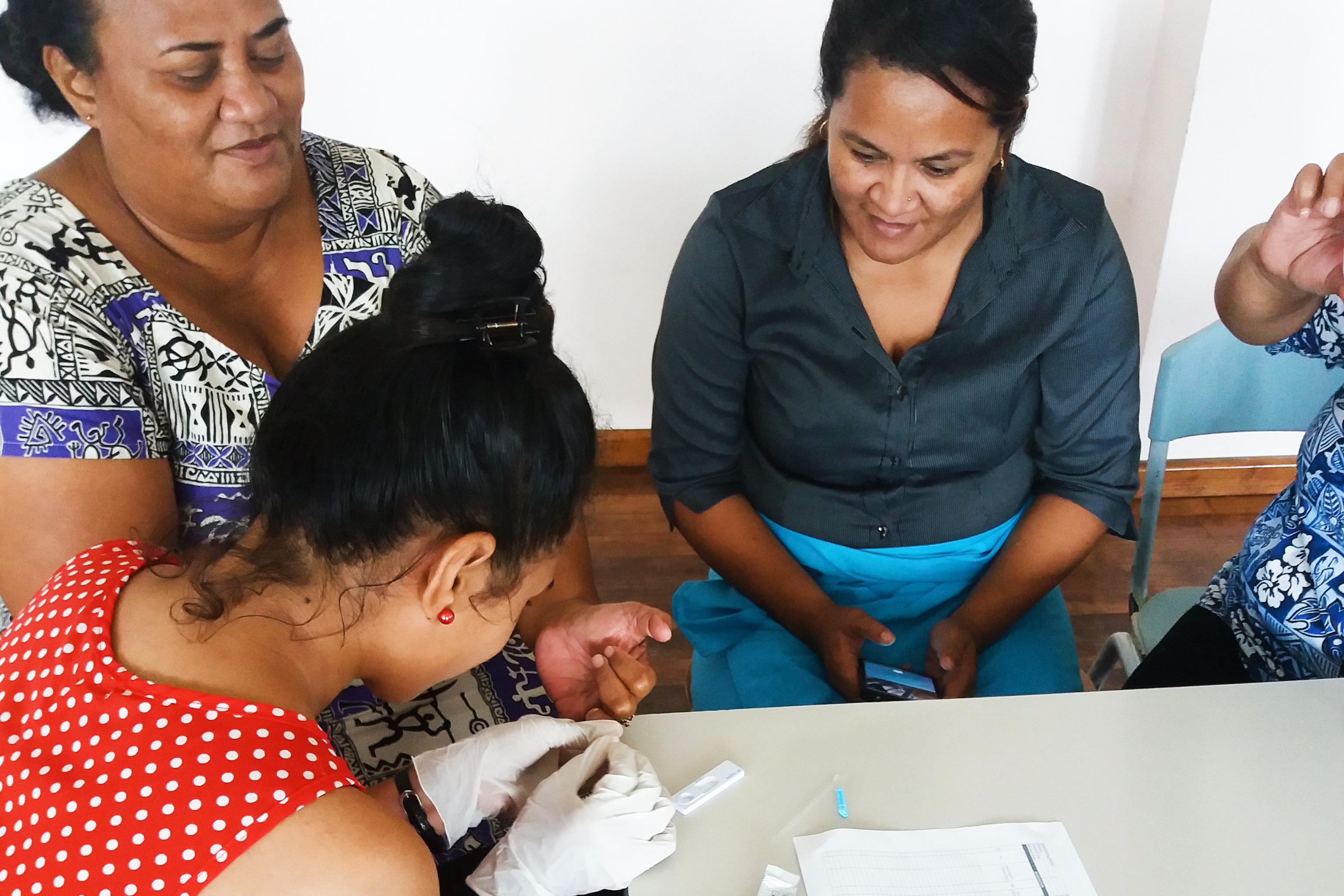Health workers take part in a training session on the Standard Diagnostics Bioline HIV/Syphilis test kit in Tuvalu on 15-16 May 2018. (Photo: UNDP/Praneel Maharaj)
A new diagnostic test for the human immunodeficiency virus (HIV) and syphilis is being rolled out by the United Nations Development Programme (UNDP) across the Western Pacific region, in order to reach the most vulnerable populations with vital sexual and reproductive health services.
In the Western Pacific, geographic isolation significantly hinders testing for HIV and other sexually transmitted infections (STIs). The majority of HIV and STI cases are detected during health care visits using laboratory-based diagnostic testing, yet populations are often scattered across a multitude of remote small islands, many with either limited or no access at all to clinical health services. People are often forced to travel great distances to seek testing, treatment and care. Additionally, test turnaround times can be lengthy, requiring patients to return on a separate date for test results, resulting in substantial loss to follow-up.
Laboratory-based testing is particularly challenging with key populations (men who have sex with men, transgender people, sex workers and people who use drugs). They face stigma and discrimination as well as legal and social barriers, further hindering their access to health services.
Rapid diagnostic tests that enable testing to be conducted at the point of care using finger prick blood or serum – such as the Standard Diagnostics Bioline HIV/Syphilis (or SD Duo) test are well suited to address these circumstances. They require no sophisticated equipment and can therefore be performed in remote locations in non-laboratory settings or in laboratories with limited facilities.
Following an initial pilot project implemented by UNDP in 2017, the SD Duo test has now been put into use in Cook Islands, Federated States of Micronesia, Kiribati, Palau, Republic of Marshall Islands, Samoa, Tonga, Tuvalu and Vanuatu, with Nauru and Niue soon to follow.
Thus far, over 30,000 test kits have been supplied to 17 implementing partners in the 11 countries, including Ministries of Health and community and non-governmental organizations. Over 90 health care workers have received training to equip them with the skills and know-how to effectively use the tests and incorporate them into their health services.
The test kits have received praise from health workers. “SD Duo is exceptionally good, easy to use and easy to interpret results,” said Head of Obstetrics and Gynecology with the Government of Tonga’s Ministry of Health, Dr. Ma'ake Tupou during a training in Tonga. “It is applicable and very much accepted in the clinical setting. It’s less time consuming and requires less time to train health care workers. The two tests are performed at one time, resulting in reduced workload, increased efficiency and the turnaround time for results is really shortened, leading to reduced waiting times for patients to get their results. SD Duo also requires a very small quantity of blood sample, making it easy to collect.”
A crucial component of the initiative was to provide training for the community and non-governmental organizations involved in the programme that are conducting outreach with key populations.
“This is the first-time health workers and the population in the Pacific islands have access to a rapid diagnostic tool allowing screening for HIV and syphilis at the same time. These tests can reach every person, including those living on remote islands,” said the Multi-Country Western Pacific Integrated HIV/TB Programme Manager with the UNDP Pacific Office in Fiji, Anna Chernyshova. “It’s imperative that we don’t leave anyone behind in our efforts to respond to HIV and sexually transmitted infections in the Pacific.”
Organizations such as the Chuuk Women’s Council are now using the tests as part of their regular outreach work in the community. “The SD Duo testing kit has made a big difference in our outreach work since it is easy to take a blood sample and the result is immediately given within 30 minutes,” said Key Populations Project Coordinator at Chuuk Women’s Council, Sincera E. Fritz.
“The presence of our HIV physician during the outreach allows our participants to see a doctor if needed and avoid a hospital visit, which is always still difficult for our key populations.”
In Tonga, the programme partners are finding the SD Duo test is having a positive impact on their HIV and STIs testing and prevention work.
“We want treatment to happen the same day as the positive test,” said one recent client of services provided by the Tonga Family Health Association.
“The beauty of using rapid testing in the Pacific is that it is encouraging more people to get tested,” said Vice President and Office Manager at the Tonga Leitis Association, Agabe Tu'inukuafe. “The SD Duo test kit has the ability to save lives.”
In addition to targeting key populations, the SD Duo tests are being used in remote antenatal clinics where there is no laboratory to strengthen sexual and reproductive health services for pregnant women and their families.
This activity is supported by the Multi-Country Western Pacific Integrated HIV/Tuberculosis (TB) Programme. The programme is funded through a three-year grant from the Global Fund and aims to strengthen control of HIV and TB in 11 Pacific island countries.

 Locations
Locations




